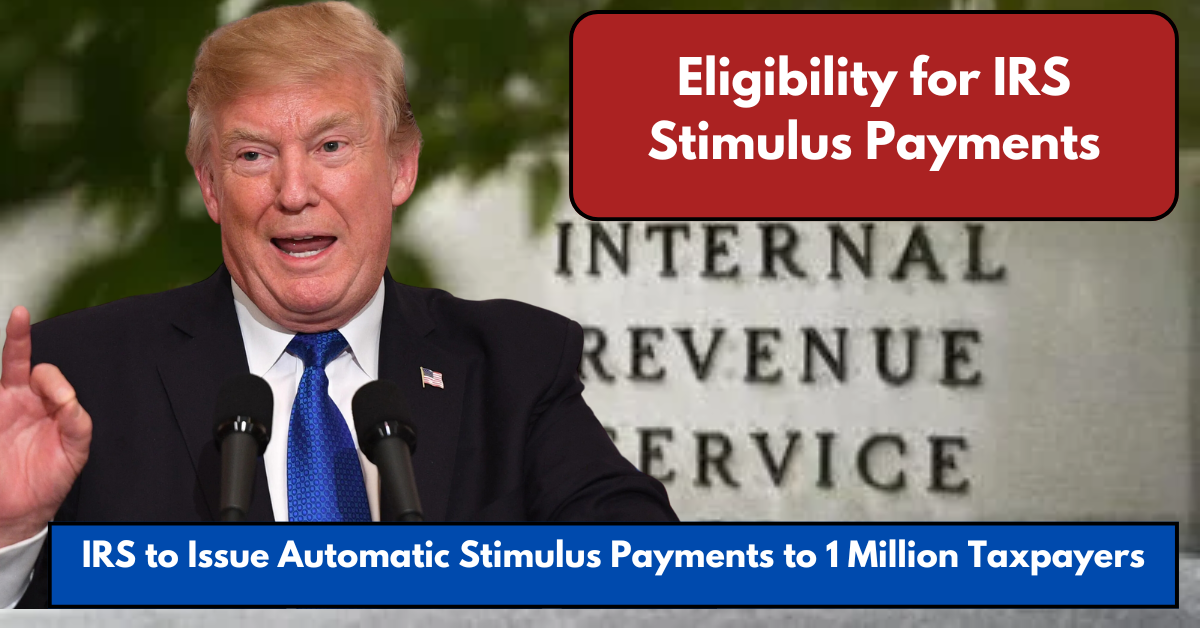The Internal Revenue Service (IRS) is sending out automatic stimulus payments to around 1 million eligible taxpayers who missed the 2021 COVID relief checks. This move is part of the IRS’s ongoing efforts to provide financial support to people who have yet to receive their Recovery Rebate Credit.
Stimulus Checks Worth $2.4 Billion
The IRS is distributing a total of $2.4 billion in payments, which are expected to be as high as $1,400 per individual. These payments started rolling out in December and are expected to reach most recipients by late January.
These stimulus payments are aimed at taxpayers who did not receive one or more of the Economic Impact Payments (EIP), commonly referred to as stimulus checks, in 2021. The IRS is making the payments automatically, so if you qualify, there’s no need to take any action.
Eligibility for IRS Stimulus Payments
The special stimulus payments are for individuals who missed out on the Recovery Rebate Credit, a refund for people who were eligible for Economic Impact Payments but didn’t get them.
To qualify for the payments, taxpayers must have filed a 2021 tax return and have an adjusted gross income (AGI) under $80,000 for single filers or $160,000 for joint filers. Payments are also available for eligible dependents, including children and adult dependents.
The IRS has been clear that no action is required for eligible taxpayers to receive these payments. The funds will either be direct deposited into the taxpayer’s bank account or sent by paper check. A separate letter will be mailed to eligible taxpayers, confirming the payment and providing additional details.
How Much Will You Receive?
The IRS has indicated that the payment amounts will vary depending on various factors. However, the maximum payment per individual can be as high as $1,400. This includes $1,400 for each qualifying adult and an additional $1,400 for each eligible child or dependent. Payments will be made automatically, so taxpayers who qualify will not need to apply for the funds.
Tracking Your Payment
If you’re wondering whether you’ve received your stimulus check, it’s important to note that most eligible taxpayers have already received their payments. If you haven’t received your payment yet, you can check your eligibility by reviewing your tax records.
Previously, the IRS had a “Get My Payment” tool to help taxpayers track their payments, but that service is no longer available. Instead, you can securely access your IRS online account to view the status of your Economic Impact Payments.
What If You Haven’t Filed Your 2021 Taxes?
The IRS is also reminding taxpayers who haven’t filed their 2021 tax return that they may still be eligible for a Recovery Rebate Credit if they submit their return before the filing deadline of April 15, 2025.
Even if you have minimal or no income, filing your 2021 tax return could help you claim the Recovery Rebate Credit and receive your stimulus payment. The IRS strongly encourages anyone who missed their payments to file their tax returns as soon as possible to get the credit.
IRS Direct File Program
For those filing taxes in 2025, there’s a new feature this year – the IRS Direct File program. Originally launched as a pilot, this program will now be available in 25 states, providing free and direct filing services to taxpayers. The filing season officially begins on January 27, 2025, with a deadline of April 15 for tax filings.
Conclusion
If you missed out on the stimulus payments in 2021, the IRS is now issuing automatic payments to those who are eligible. There’s no need to take extra steps if you qualify, as the payments will be processed and delivered automatically. Make sure to file your 2021 tax returns before the deadline to claim any outstanding stimulus funds.
This article has been carefully fact-checked by our editorial team to ensure accuracy and eliminate any misleading information. We are committed to maintaining the highest standards of integrity in our content.
Premlata is a seasoned finance writer with a keen eye for unraveling complex global financial systems. From government benefits to energy rebates and recruitment trends, she empowers readers with actionable insights and clarity. When she’s not crafting impactful articles, you can find her sharing her expertise on LinkedIn or connecting via email at biswaspremlata@gmail.com.
